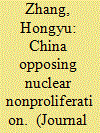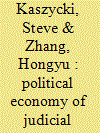| Srl | Item |
| 1 |
ID:
178265


|
|
|
|
|
| Summary/Abstract |
Why did a would-be recognized nuclear state oppose nonproliferation for two decades, but then change its position in 1984? Based on extensive fieldwork in Beijing where the author conducted 20 interviews with high-profile Chinese government and military officials, ambassadors of disarmament, and nuclear and astronautic scientists, this article argues that China openly opposed nonproliferation to give its nascent nuclear program time to achieve a retaliatory capability. Once this goal was fulfilled in the mid-1980s, China began accepting nonproliferation norms. While China’s fervent opposition seemed ideological in a revolutionary era, it was indeed a rational behavior in pursuit of security interests.
|
|
|
|
|
|
|
|
|
|
|
|
|
|
|
|
| 2 |
ID:
166867


|
|
|
|
|
| Summary/Abstract |
This article analyzes the North Korean nuclear crisis from a balance-of-power perspective. It is in the long-term interests of international peace for a secure and independent North Korea to serve as a buffer between US and Chinese ground forces. However, the conventional military advantage of the South Korean-American alliance over North Korea has grown drastically since the end of the Cold War, threatening North Korea’s survival. Since North Korea lacks any reliable ally, nuclear weapons represent its most cost-effective way to restore a balance of power and thus secure itself. Accepting security guarantees in exchange for its nuclear arsenal is rhetorically appealing but not a viable approach. North Korea’s development of intercontinental ballistic missiles (ICBMs), however, has overcompensated for the post-Cold War imbalance, inviting talk in Washington of waging a preventive war. Persuading North Korea to give up its ICBM capability, not its nuclear arsenal, should therefore be the primary objective of US diplomacy.
|
|
|
|
|
|
|
|
|
|
|
|
|
|
|
|
| 3 |
ID:
152345


|
|
|
|
|
| Summary/Abstract |
Like other developing countries, China has been struggling with corruption. Judicial corruption, in particular, damages the rule of law and presents a market disruption as an outcome of a lack of commitment by the government regarding property rights. This article seeks to explain the variations in judicial corruption within China, and it develops a theory of city-level corruption of judges. The theory is tested by an empirical study with data from the World Bank corruption survey using a Bayesian spatial linear model. While wealth appears to diminish corruption, there is also a strong spatial relationship with regard to the level of judicial corruption in China, indicating that as some regions become less corrupt, surrounding areas also experience a diminution in corruption. Thus, through a process organic to the current regime, China could experience an increase in judicial trustworthiness.
|
|
|
|
|
|
|
|
|
|
|
|
|
|
|
|